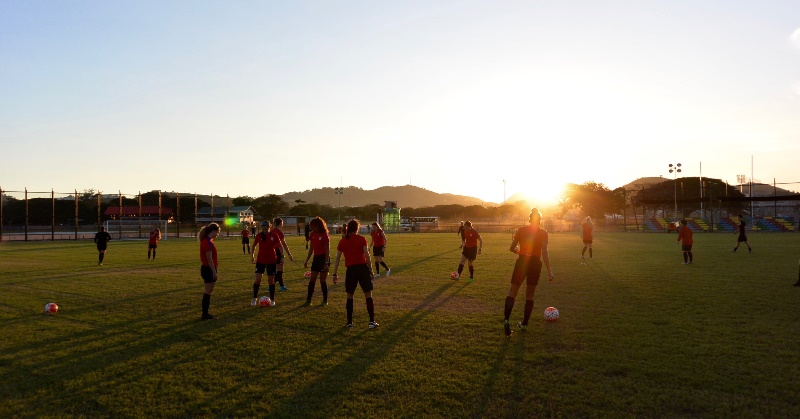What’s the real problem? American soccer and a culture of mastery

Editor’s note: The following is a guest column by Kris Ward. Ward worked as a coach in Washington, D.C., Northern Virginia and Maryland for 15 years, most recently as Director of Recreational Soccer at D.C. Stoddert in the nation’s capital. Previously, he worked in D.C. United’s youth academy, NWSL, Maryland ODP and for several youth clubs in the D.C. metro area. Recently relocated to Los Angeles, he now works as a coach for FCLA in West LA and is studying sociology and communication in sport.
Billy Beane: “Guys, you’re just talking. Talking, “la-la-la-la,” like this is business as usual. It’s not.”
Grady Fuson: “We’re trying to solve the problem here, Billy.”
Billy Beane: “Not like this, you’re not. You’re not even looking at the problem.”
Grady Fuson: “We’re very aware of the problem. I mean…”
Billy Beane: “Okay, good. What’s the problem?”
Grady Fuson: “Look, Billy, we all understand what the problem is. We have to…”
Billy Beane: “Okay, good. What’s the problem?”
Pittaro: “Same as it’s ever been. We’ve gotta replace these guys with what we have existing.”
Billy Beane: “Nope. What’s the problem, Barry?”
Scout Barry: “We need 38 home runs, 120 RBIs and 47 doubles to replace…”
Billy Beane: “Ehhht! [imitates buzzer]”
This is an illuminating discourse at the beginning of the movie “Moneyball.” It is also a common conversation throughout athletics, learning and development. In soccer, debates rage about specialization, physical literacy, culture vs. training, club vs. high school, Development Academy vs. ECNL. Everyone thinks they know what the problem is when it comes to development, and they also believe they have the answer. I don’t think they are even looking at the problem.
 So what is the problem? In my opinion, the United States does not have a culture of mastery. We are an over-caffeinated, over-stimulated, over-worked, microwave culture that values results above all else. We are programmed only to see the fruits of the labor and trained to ignore, if not avoid, the labor itself.
So what is the problem? In my opinion, the United States does not have a culture of mastery. We are an over-caffeinated, over-stimulated, over-worked, microwave culture that values results above all else. We are programmed only to see the fruits of the labor and trained to ignore, if not avoid, the labor itself.
SportsCenter shows clips of home runs, diving catches, miraculous saves and brilliant goals. It is drilled into our heads in endless loops. We idolize the greats, but we speak more about their talent than their effort. We talk more about their records than their character. ESPN doesn’t show the thousands of hours of training, of soaking in a cold tub, of getting blisters lanced and broken fingers being bandaged.
They don’t show the time athletes spend on a bus, on a plane, cramped and getting stiff. They don’t show you players who are forced to live with a random family because their club can’t afford to pay them enough to rent an apartment. They don’t show you players who have to work second jobs or who have to sign up for every possible club appearance just so they can make ends meet. Think for a moment what might happen if they did. This is brilliantly summarized in a commercial Michael Jordan did a few years back.
In “The Talent Code,” Daniel Coyle mentions an old but extremely successful tennis coach in Russia named Larisa Preobrazhenskaya. Preobrazhenskaya believed in rigorous technical training and did not allow her students to compete in any tournaments for the first three years in which they worked with her.
“It’s a notion that I don’t imagine would fly with American parents,” Coyle speculated, “but none of the Russian parents questioned it for a second.”
It’s probably true. I have flirted with the idea myself, spoken to countless coaches about it, spoken to parents about it. At the end of the day it is so far removed from what “we” are comfortable with that very few would take the leap.
So if America does not have a culture of mastery, what do we do? The good news is, culture is malleable. Over the last seven years a pickup game sprouted up in Northern Virginia. It began with me and two women’s national team players. Slowly we picked up numbers; coaches that I worked with, kids who were home from college, MLS players and NWSL players who were in their offseasons.
Before the game began, I would gather with the two national teamers and we would do technical work for 30-45 minutes. And this is where it is different. The work we did was aimed at mastery. If I said we were going to do 20 repetitions of a certain skill, that meant we were going to do 20 PERFECT reps. Even if it took 20 minutes, they were not satisfied until they had done 20 perfect reps and achieved even a small level of mastery.
Trying to stay warm w/some technical races this morning. @Yael_Averbuch @igottheMenchies @bwarshaw14 you missed it! pic.twitter.com/gpOEIS8SSa
— the quest (@KWKaizen) December 4, 2015
For years we worked on a daily basis. That’s right, YEARS. Always pushing the bar higher and higher, always aiming for mastery. Anything but your best effort was unacceptable. At that point in time there was no guarantee that a women’s professional league would return. The future was uncertain, but their relentless pursuit of mastery was constant.
Throughout those years other players would occasionally join in the technical work: high-school players, college players, pros and other national team players. Sometimes those who joined us were uncomfortable with what was being asked. They were not used to striving for mastery, they were simply used to doing the prescribed work: 20 reps is 20 reps. Even if 18 of those reps hit them in the shin and bounced away, they did their 20 and that was it.
Undoubtedly those players did not return to the technical work – it was uncomfortable. After all, America is not a culture of mastery.
However, sometimes those technical sessions inspired others to search for mastery. I would watch a young player join in and while initially their default was to simply do the 20 reps regardless of success, when they saw the two national team players were not settling for that, the young players suddenly had a new model for behavior. Suddenly it was not acceptable to do anything BUT aim for mastery.
What a session today! @kayyay3 @Toni_Deion @emilybruder2 and @mhuster11 putting it in #kaizen pic.twitter.com/iTIKBEBqof
— the quest (@KWKaizen) July 20, 2014
You see, this wasn’t something that had been modeled in their team trainings. This wasn’t something they saw on television. This was unfamiliar to them. Maybe the change in attitude was down to a little bit of peer pressure, of wanting to fit in. Maybe it was recognizing that this was the difference between good and great. Maybe it was simply the fact that they were seeing there was a higher level and it was possible to reach that level if they did the work.
It wasn’t easy or glamorous; it was difficult and taxing. Physically, mentally and emotionally, those sessions were brutal. Imagine doing 19 perfect reps and having the last one squib off your toe. Or being a teenager and having someone who just competed in a World Cup serve to you and you can’t get the ball back to them. That can be defeating.
Imperfections were exposed and wills were tested, but they didn’t back down. They embraced the struggle and camaraderie grew between those willing to do the work. The point is these sessions created a shift in culture. We created a culture that existed separately from the rest of our peers. A culture of mastery right here in America.
Even in the cold and rain, the great ones are always looking to improve. #kaizen pic.twitter.com/lkiIXdadKm
— the quest (@KWKaizen) December 22, 2014
That culture created a ripple effect that is still moving through a small pocket of players in Northern Virginia. It spread over a few generations. One of those players that was positively affected received her first cap with the full women’s national team a few weeks back. Others went on to be four-year starters at ACC programs and professional players abroad. One has been in the Under-17 national team and is headed to a big ACC school in a few years. All of this because the right behavior was modeled for them.
America may not be a culture of mastery. But it can be.
SOCCERWIRE MARKETPLACE
- visitRaleigh.com Showcase Series 2025, hosted by NCFC Youth
- OFFICIAL MANCHESTER CITY SOCCER CAMPS
- Wanted Licensed Youth Soccer Coach
- Join Official Elite Summer Soccer Camps with Europe’s Top Pro Clubs!
- The St. James FC Travel Staff Coach - North (Loudoun) & South (Fairfax)
- The St. James FC Girls Academy (GA) Head Coach - 2 teams
- The St James FC Boys Travel Tryouts
- OFFICIAL BAYERN MUNICH SUMMER CAMPS U.S.
- JOIN THE ALLIANCE!
- OFFICIAL FC BARCELONA CAMPS U.S.











